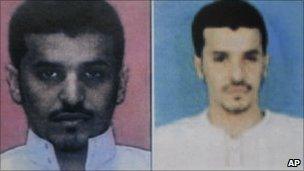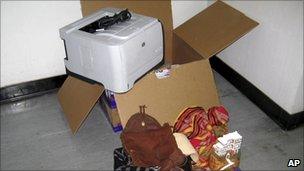Saudi man 'key suspect' in jet bomb plot, says US
- Published

Ibrahim Hassan al-Asiri was said to be behind a plot to kill a Saudi prince last year
US officials have suggested a Saudi bombmaker is the key suspect in last week's attempt to send two parcel bombs from Yemen to the US on cargo planes.
They named the man as Ibrahim Hassan al-Asiri, who is said to be the main bombmaker for al-Qaeda's Yemeni branch.
It has emerged that one of the bombs was carried on two passenger planes before being seized in Dubai.
A Yemeni woman suspected of sending the bombs has been freed. She said she was the victim of identity theft.
Britain's authorities have come under criticism after the initial failure to find one of the two bombs on a plane at East Midlands airport.
Both devices - hidden inside printer toner cartridges - contained the powerful plastic explosive PETN, which is difficult to detect.
'Dangerous individual'
US intelligence officials said they believed that Asiri, said to be in his 20s, was the key suspect behind the failed plot.
"Asiri's past activities and explosives' experience make him a leading suspect," a US official was quoted as saying by the AFP news agency.
US President Barack Obama's counter-terrorist adviser, John Brennan, said both bombs were built by the same man who made the explosive device used in a failed "underpants" plane bomb attack over Detroit on Christmas Day.
All three contained PETN, and one of the detonators was reportedly almost exactly the same as the one used in the US attack.
"I think that the indications are right now based on forensic analysis that the individual responsible for putting these devices together is the same," Mr Brennan told ABC News. "He's a very dangerous individual - clearly somebody who has a fair amount of training and experience.
"We need to find him and bring him to justice as soon as we can."
Asiri is also believed to have built the bomb that his brother, Abdullah, used in an assassination attempt on the Saudi intelligence chief, Prince Mohammed Bin Nayif. The prince survived the suicide attack, in which PETN was also used.
Mr Brennan also said the US and its allies could not assume that there were no other packages containing bombs out there.
"So what we are trying to do right now is to work with our partners overseas to identify all packages that left Yemen recently, and to see whether or not there are any other suspicious packages out there that may contain these [Improvised Explosive Devices]," he told ABC.
US investigators are also re-examining wreckage of a UPS cargo plane that crashed in Dubai in September.
Two crew members died when the jet crashed shortly after take-off.
On Sunday investigators in the United Arab Emirates said there was no evidence that the crash was caused by an explosion.
Britain's 'weakness'
Yemeni officials on Sunday told the BBC that the released Yemeni woman - named as 22-year-old student Hanan al-Samawi - was granted conditional freedom after investigators concluded her identity was stolen by an individual who knew her full name, address and telephone number.
Dozens of students earlier staged a sit-in at Sanaa University, protesting against Ms Samawi's arrest.
The two packages seized on Friday were shipped from Sanaa through UPS and another US cargo firm, FedEx. The parcels were addressed to synagogues in the US city of Chicago.

The device had been placed in a cardboard box and posted to the US
One device was carried on an Airbus A320 from Sanaa to Doha. It was then flown on another aircraft to Dubai, Qatar Airways said.
"The carrier stated that, as per Chicago Convention, it is not the responsibility of the country in which the cargo transits to X-ray or inspect the cargo. This responsibility belongs to the country from where the consignment originates," the company said in a statement.
"Furthermore, the explosives discovered were of a sophisticated nature whereby they could not be detected by X-ray screening or trained sniffer dogs. The explosives were only discovered after an intelligence tip off."
In a BBC interview on Sunday, Britain's independent reviewer of counter-terrorism laws said the initial failure to find the bomb at East Midlands Airport was a "weakness".
Lord Carlile said technical equipment needed to be investigated to ensure it was "absolutely up to date".
A Metropolitan Police spokesman said UK investigators had at first declared the device at East Midlands "safe" before carrying out a re-examination as a "precaution".
"Further examination of the package by explosives officers identified items of concern. Cordons were put back in place as a precaution prior to items being removed for further scientific analysis," the spokesman said.
The UK government's emergency planning committee, Cobra, will now meet on Monday to discuss increasing cargo security.